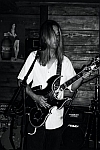 Interview with
Interview withCameron Carbrey (vocalist/songwriter/guitarist) of The Grumpy
THE GRUMPY has achieved numerous recognitions for their musical abilities both in playing and composing their music. Front man vocalist/songwriter/guitarist Cameron Carbrey took his skills into his own hands and thus created THE GRUMPY and has never looked back. When he created and played the original music score for ‘Van Gogh: How Can We Make Our Pictures Speak’ (Doniel Soto), a modern take with the impression of the painter's life and wound up going off Broadway with the project. After work shopping the show at California's University to which he was still in high school.
But that's not all he had accomplished he also knew how to play several instruments at the time being a mastermind at hand. Since then, Cameron has played in a handful of bands including The Outlaw Josie Wales Band, hip-hop group Hurchu among many others. Leading him down a musical career lane he can cherish until the end of time. He has grasped a hold of all of THE GRUMPY's performances taken place over the North and South terrains of California and been featured upon the most popular publications in the reading world. In close THE GRUMPY has done it all and doesn't plan on stopping anytime soon.
Reflections of Darkness (RoD): How, when, and why did you form?
Cameron Carbrey (Cameron): Well, JW and I have been lifelong friends and played in a ton of bands together from death metal to country. I knew he had the desire to play music without binding himself to genre. I had written some material around 1999 and asked JW to play drums and he jumped right on in. Several years later, when we finally found our bassist Justin and we heard for the first time something we'd wanted since the beginning: a unifying voice. Our next release is going to bring more of our diversity to the table from this utopian marriage of soul and chops. It's exciting to hear how we're really coming into ourselves with this line-up.
RoD: Who do you consider your major influences?
Cameron: I try to listen to an ever changing stream of music. The ones that stay anchored by me are artists like Pink Floyd and Bela Fleck. I have quite a sweet tooth for some Sepultura now and then, coupled with a profound love of Motown. I listen to a lot of hip-hop and try to bring what I can from it, but it's a delicate line I want to tastefully walk. Rza is a pretty big influence from that genre. World music and instruments are fascinating to me, too.
RoD: How would you describe your sound?
Cameron: Honestly, that seems to be the hardest question to answer. We don't set boundaries in our writing. We have so many songs from so many genres. We write anything that strikes us, no matter if it is death metal or country. We generally stay in the middle on rock, but we have some punk, folk, reggae, pop ballads, jazz and blues in our original catalogue. Rather than limit ourselves to genre, we just limit ourselves to being tasteful in whatever we decide to play. I guess I'd describe it as diverse and honest.
RoD: What are a majority of your songs about? Is there an underlying theme?
Cameron: I usually write about things that I have gone through, or things close friends have gone through. Things that happen to all of us or things that are happening to all of us. There are a lot of things to write about in today's world climate, but I like to write in retrospect, if possible. Ultimately, I try to make sure there's a positive message behind it or a solution to the problem. Many of the songs deal with triumph over challenges. There's a spirituality I'm hoping to pass on to the listener in a very subtle way. I don't want to tell anyone how to think, I just want to encourage them to think for themselves. You'll seldom see or hear cursing in the lyrics. I believe that if words have value, they don't need "enhancements". Some songs are just random snapshots of time or places that have touched me in some way. The origin of each song is unique in its inception. Throes of Contemplation is largely about righting internal moral wrongs and taking a stand for yourself. Loving yourself and getting to better places by intentional effort. With the exception of the closing track, which is a cautionary tale about the other side of the same coin. I aim to tell both sides of any story whenever possible.
RoD: What are your immediate music career goals?
Cameron: Our immediate goals are to get our music published and reach as many people as possible. Each time someone tells me how a song has touched them, it makes me want to get the music out and bring other people that kind of peace. As many people as possible. We are currently getting situated with a company based out of L.A. to secure some publishing for our latest recording, but it's still in infancy. The last couple years have been heavy trench work for us. It was time to pay dues.
RoD: What are your long-term music goals?
Cameron: I plan on continuing to write, record and perform until my fingers won't wiggle. I am constantly reinventing the writing style I use to stumble on new ideas and perspectives. I hope to have had a prolific career that is diverse, unique and artistic by the time I close the guitar case for the last time. I hope to have changed lives, even if only a few.
RoD: What kinds of instruments do you guys prefer?
Cameron: I play over a dozen different instruments, but I primarily stick to guitar and piano. As a guitarist, I use mostly Minarik guitars. I do pull out the occasional Gibson SG or Fender Tele, but you'll almost always see me playing Minarik through my Mesa/Boogie. JW has been on a Tama drum set since he was a kid. He's always been a Zildjian guy as far as cymbals go. Justin has the strangest bass rig known to man. He's playing a Schecter bass at the moment, through a Hammond amp that he pulled out of an organ that's powering my 1972 2x15 Fender Bassman cabinet. It's got a great tone, but it looks very Frankenstein to me. It's a good thing ears don't have eyes.
RoD: Explain your ideas of an ideal show?
Cameron: I'd say our show at the Viper Room in Hollywood last July was pretty ideal. There were times during the set that the crowd was singing along to our originals so loud, I couldn't hear my own voice through the monitors. When you finish a song and the sonic boom of the crowd hits you so hard that your ears flat line on you, that's a good show.
RoD: Out of all the shows you have played, is there one that stands out as a favourite? Is so, please explain.
Cameron: That is a tough one. Favourite because of the laughs we have now or the laughs we had then? [laughs] The one that sticks with me is one we laugh about now. We played a double birthday party at a private rest home. One birthday boy was turning 30 and the other was turning 80, so you could say it was a mixed crowd. It was about 110 degrees outside and we set up next to the pool under an awning that covered us for the first 20 minutes. The part that is so memorable is how many people from different backgrounds, ages and music tastes really enjoyed and respected our work. It was worth every gallon of sweat to see so many happy faces.
RoD: Who are some of your favourite bands to share the stage with? Can you name some of the bigger bands that you've played with if any?
Cameron: We've played with a few bigger bands, but haven't really found a niche we fit best with yet. We did a show with Stephen Pearcy (RATT) that went really well in San Juan Capistrano and played with White Lion up here in Sacramento. I think my favourite guy I've played with was probably when I did an acoustic performance of one of my songs with Tesla's guitarist Frank Hannon backing me on lead. That was such a great time, because I knew Frank loved that tune and he decided to join me about a quarter of the way through the song. He was so very tasteful, it was quite memorable.
RoD: Briefly describe your music making process.
Cameron: Since I teach music privately, I am constantly studying new voicings, progressions, scales and rhythms. I will tend to get a melody or a series of progressions stuck in my head until I write them down. Once I get them recorded or written, they stop plaguing my head and make way for a new song. It's a blessing and a curse, in some ways.
RoD: What has been your biggest challenge as a band? Were you able to overcome it?
Cameron: Our biggest challenges have been finding the right third guy, and figuring out what kind of music we play. We found the third guy, but we still have no idea what to call the breadth of our music.
RoD: What advice do you have for fans who want to start their own bands?
Cameron: Soul and passion is not a substitute for practice and study. It's a complimentary component. Never second guess yourself or your listener. Be open-minded. Don't be afraid to make mistakes, but learn from each and every one. Be yourself, because it's you that people are listening to.
RoD: Why should people know about you? What sets you apart?
Cameron: I think we bring something to the table that's been missing in the mainstream for a great deal of time. We have passion, a positive message, insight, clarity, and depth. We're not your run-of-the-mill drop C band. We're not even a drop C band. When people listen to us, they open their mind. What's better than people with open minds? I don't think anything is. I like to think of our music as good for your soul.
RoD: What’s next for you guys? Any upcoming tours, releases, anything of that nature?
Cameron: We are hard at works on our next album. We've got about 16 tunes on the block right now and several more on the way. Once I get it all written and cut down to about 12-13 of our favourites, I think we're going to have quite a ground-breaking album that could maybe even change the way people file and fall into genre-based thinking. When people ask me what kind of music I prefer, I always reply, "Good music". I still stand by that. What defines good? Art, message, soul, skill or any combination of those things that reaches past your ears and into your heart.
{jos_sb_discuss:21}






Comments powered by CComment